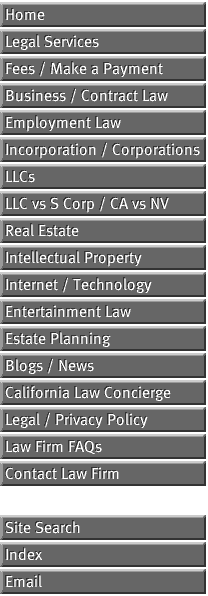
CALIFORNIA GENERAL CORPORATION LAW - CHAPTER 10 Section 1000. Any mortgage, deed of trust, pledge or other hypothecation of all or any part of the corporation's property, real or personal, for the purpose of securing the payment or performance of any contract or obligation may be approved by the board. Unless the articles otherwise provide, no approval of shareholders (Section 153) or of the outstanding shares (Section 152) shall be necessary for such action. 1001. (a) A corporation may sell, lease, convey, exchange, transfer, or otherwise dispose of all or substantially all of its assets when the principal terms are approved by the board, and, unless the transaction is in the usual and regular course of its business, approved by the outstanding shares (Section 152), either before or after approval by the board and before or after the transaction. A transaction constituting a reorganization (Section 181) is subject to the provisions of Chapter 12 (commencing with Section 1200) and not this section (other than subdivision (d)). A transaction constituting a conversion (Section 161.9) is subject to the provisions of Chapter 11.5 (commencing with Section 1150) and not this section. (b) Notwithstanding approval of the outstanding shares (Section 152), the board may abandon the proposed transaction without further action by the shareholders, subject to the contractual rights, if any, of third parties. (c) The sale, lease, conveyance, exchange, transfer or other disposition may be made upon those terms and conditions and for that consideration as the board may deem in the best interests of the corporation. The consideration may be money, securities, or other property. (d) If the acquiring party in a transaction pursuant to subdivision (a) of this section or subdivision (g) of Section 2001 is in control of or under common control with the disposing corporation, the principal terms of the sale must be approved by at least 90 percent of the voting power of the disposing corporation unless the disposition is to a domestic or foreign corporation or other business entity in consideration of the nonredeemable common shares or nonredeemable equity securities of the acquiring party or its parent. (e) Subdivision (d) does not apply to any transaction if the Commissioner of Corporations, the Commissioner of Financial Institutions, the Insurance Commissioner or the Public Utilities Commission has approved the terms and conditions of the transaction and the fairness of those terms and conditions pursuant to Section 25142, Section 696.5 of the Financial Code, Section 838.5 of the Insurance Code, or Section 822 of the Public Utilities Code. 1002. Any deed or instrument conveying or otherwise transferring any assets of a corporation may have annexed to it the certificate of the secretary or an assistant secretary of the corporation, setting forth that the transaction has been validly approved by the board and (a) stating that the property described in said deed or instrument is less than substantially all of the assets of the corporation or that the transfer is in the usual and regular course of the business of the corporation, if such be the case, or (b) if such property constitutes all or substantially all of the assets of the corporation and the transfer is not in the usual and regular course of the business of the corporation, stating the fact of approval thereof by the outstanding shares (Section 152) pursuant to this chapter or Chapter 12, as the case may be, or that such approval is not required by Chapter 12. Such certificate is prima facie evidence of the existence of the facts authorizing such conveyance or other transfer of the assets and conclusive evidence in favor of any innocent purchaser or encumbrancer for value. California Corporations Code > Sections 1000-1002 < Sections 900-911 | Sections 1100-1113> |
© 2000-2024 Law Office of Jonas M. Grant, A.P.C. All rights reserved. |